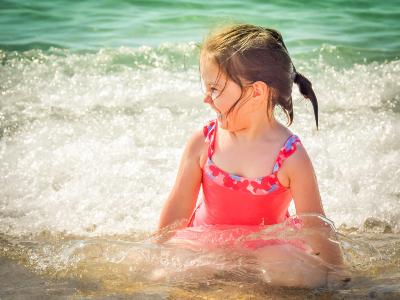-
 Use sunscreen that says “broad-spectrum” which includes protection against UVA and UVB rays.
Use sunscreen that says “broad-spectrum” which includes protection against UVA and UVB rays. - Use sun protective factor (SPF) of at least 15 or higher.
- Look for the new “Star” rating system 1-4; as 1 is low protection, 2 is medium protection, 3 is high protection, 4 is highest protection.
- For sensitive areas of body (nose, cheeks, ears, shoulders) use sunscreen with zinc oxide or titanium dioxide for best protection and stays visible on skin longer.
- For new sunscreen apply to small area the day prior, wash away, and look for rash or skin irritation.
- Use enough sunscreen to cover all exposed areas, especially the face, nose, ears, feet, and hands.
- Put on sunscreen 15-30 minutes before going outdoors to allow absorption into the skin.
- Reapply sunscreen every 2 hours, if swimming or sweating reapply every 45 minutes.
- Remember to use sunscreen even on cloudy days as UV rays still come through the clouds and can bounce back from water, sand, snow, and concrete.
- Babies younger than 6 months of age: use sunscreen in small areas of the body such as the face, backs of hands and top of feet if protective clothing and shade are not available.
- Babies older than 6 months of age: apply sunscreen to all areas of the body, but be careful around the eyes and face as they can rub into eyes.
- Keep babies younger than 6 months out of direct sunlight. Use shade, tree, umbrella, or stroller canopy.
- Dress in cool comfortable clothes, large brimmed hat, and sunglasses with UV protection.
- Select clothes with tight weave instead of loose weave.
- Limit sun exposure between 10:00am and 4:00pm.
- Always use sunscreen. Set a good example by also protecting yourself.
- Keep well hydrated; remember children and babies will become dehydrated more quickly.
- Darker skinned individuals can still develop sunburns and skin conditions due to sun exposure.
- Push fluids, cool water or low calorie electrolyte containing solutions.
- Apply cool compresses to burned areas.
- Give pain medication as needed for sunburn. May give acetaminophen if under 6 months of age. If over 6 months of age may give either acetaminophen or ibuprofen.
- Keep child out of the sun and heat until healed. In future child is more likely to burn due newly healed skin so extra caution must be taken with sunscreen use and reapplication.
- If sunburn causes blisters, fevers, chills, headaches, generalized illness; then call MacKoul Pediatrics.
- Open burns may become infected and need treatment with antibiotics.
- If fainting, heat stroke, or dehydration occurs, you should seek immediate medical attention.
- Severe sunburns must be treated like any other serious burn and should seek immediate medical attention. Hospitalization sometime is required in severe cases.
MacKoul Pediatrics is an amazing local pediatrics office in Cape Coral, FL where caring, compassionate doctors and nurses work with you to keep your children as healthy as possible. MacKoul cares for children from birth to college age, from Cape Coral, Fort Myers, Naples, and beyond.
May 12, 2016

![[IMAGE]](http://static.mackoulpediatrics.com/images/858_ncqa_logo_centered.png)

